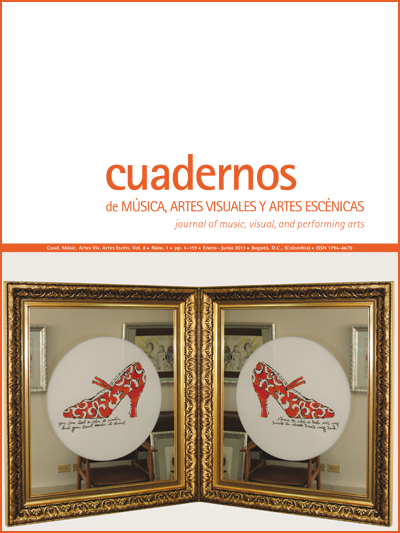Resumen
Este artículo explora la reflexión que Hannah Collins desarrolla en su videoinstalación Soledad y compañía (2008-2010) sobre la relación entre la identidad híbrida del inmigrante poscolonial y la idea de la hospitalidad como una ética de la diáspora. A partir de los conceptos de no-lugar, textualidad, micro-relato, hibridez, doble conciencia y diáspora de algunos autores posmodernos, se observa cómo las narraciones performativas de los inmigrantes argelinos activan simbólicamente el espacio visual de la fábrica abandonada y configuran así una geografía imaginaria, nostálgica y utópica que deconstruye la oposición entre el territorio del yo hospedador -el ‘ciudadano’ de la nación poscolonial- y aquel del origen mutilado del otro huésped -el inmigrante, el sujeto diaspórico-. Entendida como la condición de posibilidad de la hibridez cultural en la diáspora, se concluye que esta geografía deconstructiva es el fundamento de una relación hospitalaria entre sujetos diferentes en un mundo poscolonial -una relación ética que subyace en la experiencia estética del espectador.
Esta revista científica se encuentra registrada bajo la licencia Creative Commons Reconocimiento 4.0 Internacional. Por lo tanto, esta obra se puede reproducir, distribuir y comunicar públicamente en formato digital, siempre que se reconozca el nombre de los autores y a la Pontificia Universidad Javeriana. Se permite citar, adaptar, transformar, autoarchivar, republicar y crear a partir del material, para cualquier finalidad, siempre que se reconozca adecuadamente la autoría, se proporcione un enlace a la obra original y se indique si se han realizado cambios. La Pontificia Universidad Javeriana no retiene los derechos sobre las obras publicadas y los contenidos son responsabilidad exclusiva de los autores, quienes conservan sus derechos morales, intelectuales, de privacidad y publicidad.
El aval sobre la intervención de la obra (revisión, corrección de estilo, traducción, diagramación) y su posterior divulgación se otorga mediante una licencia de uso y no a través de una cesión de derechos, lo que representa que la revista y la Pontificia Universidad Javeriana se eximen de cualquier responsabilidad que se pueda derivar de una mala práctica ética por parte de los autores. Como consecuencia de la protección brindada por la licencia de uso, la revista puede publicar retractaciones o corregir la información ya publicada. La publicación de contenidos en esta revista no representa regalías para los contribuyentes.


